Hello and welcome to Episode 54 of Read Paradise Lost with me, Jane Davis, a podcast and Substack newsletter about my project to read all of Paradise Lost by John Milton, aloud, and with a sometimes word-by-word, sometimes line-by-line discussion. This is a one-take recording with no editing, so forgive noise of seagulls, my coughing, or sound of men drilling next door. Rough and ready reading is what you get.
See Episode 1 for an introduction to the project.
Last week we’d left Eve embracing Adam - ‘unreproved’ - and now we go back to that moment, and hear how this lovely embrace seems to Adam. Just a quick read of 38 lines this week. I’ll read it all through first:
he in delight
Both of her Beauty and submissive Charms
Smil'd with superior Love, as Jupiter
On Juno smiles, when he impregns the Clouds [ 500 ]
That shed May Flowers; and press'd her Matron lip
With kisses pure: aside the Devil turnd
For envie, yet with jealous leer maligne
Ey'd them askance, and to himself thus plaind.
Sight hateful, sight tormenting! thus these two [ 505 ]
Imparadis't in one anothers arms
The happier Eden, shall enjoy thir fill
Of bliss on bliss, while I to Hell am thrust,
Where neither joy nor love, but fierce desire,
Among our other torments not the least, [ 510 ]
Still unfulfill'd with pain of longing pines;
Yet let me not forget what I have gain'd
From thir own mouths; all is not theirs it seems:
One fatal Tree there stands of Knowledge call'd,
Forbidden them to taste: Knowledge forbidd'n? [ 515 ]
Suspicious, reasonless. Why should thir Lord
Envie them that? can it be sin to know,
Can it be death? and do they onely stand
By Ignorance, is that thir happie state,
The proof of thir obedience and thir faith? [ 520 ]
O fair foundation laid whereon to build
Thir ruine! Hence I will excite thir minds
With more desire to know, and to reject
Envious commands, invented with designe
To keep them low whom knowledge might exalt [ 525 ]
Equal with Gods; aspiring to be such,
They taste and die: what likelier can ensue?
But first with narrow search I must walk round
This Garden, and no corner leave unspi'd;
A chance but chance may lead where I may meet [ 530 ]
Some wandring Spirit of Heav'n, by Fountain side,
Or in thick shade retir'd, from him to draw
What further would be learnt. Live while ye may,
Yet happie pair; enjoy, till I return,
Short pleasures, for long woes are to succeed. [ 535 ]
Before we come on to the big questions about Satan, I have to pick up a few thoughts about the hierarchy between Adam and Eve. I must keep telling myself to get over it…to remember that patriarchy has always and until very recently (and even now not in all situations) had women in second place. I have to keep telling myself, don’t get caught on this snag, Jane, look for what you can be interested in. But I’m aware of that snag, catching at me.
Remembering back to last week, Eve had given her history of her own consciousness, and explained how she hadn’t found Adam as immediately attractive as the reflection in the pool - ‘yet methought less faire,/Less winning soft, less amiablie milde’, - which makes me wonder, is this immediate preference for the softer, milder, more aimiable simply accustomisation, or is it an innate inclination in Eve not to have a lover stronger, more powerful than herself?
Would you want a lover ‘superior’ to yourself? For now, as she turns to him,
he in delight
Both of her Beauty and submissive Charms
Smil'd with superior Love, as Jupiter
On Juno smiles, when he impregns the Clouds [ 500 ]
That shed May Flowers; and press'd her Matron lip
With kisses pure:
Adam is delighted by both her beauty and her ‘submissive charms’… which is all just about ok with me, but when he smiles ‘with superior love’ I’m less at ease, (but remember, Jane, thousands of years of patriarchy behind Milton at this point, plus a disastrous first marriage in which his much younger and -one supposes - he assumes, submissive wife fled his home and the marriage after a matter of days. A man might long for beauty and submission after that. A man with possibly the largest amount of book-learning in Europe might feel ‘superior’, alongside an uneducated woman many years his junior, too. )
But stop, Jane! Don’t get stuck in this old groove. Imagine a greater creature - say a Canopean agent in Doris Lessing’s Sci Fi novel, The Sirian Experiments, falling in love with a less developed, less Canopean, being… but you see, that’s just what I can’t do. Because I need to imagine them not as a hierarchy but as a true and equal though different pair. If I did have to think of Doris’s Sci fi, I’d be looking at The Marriages Between Zones…
I tell myself Milton can’t do sexual beings equal but different. But there are many other wonderful things he can do. I simply have to ignore this aspect of Milton’s thinking and not let it damage my estimate of other parts of his work.
So I press on, and now we see the effect of all this on Satan:
aside the Devil turnd
For envie, yet with jealous leer maligne
Ey'd them askance, and to himself thus plaind.
Sight hateful, sight tormenting! thus these two [ 505 ]
Imparadis't in one anothers arms
The happier Eden, shall enjoy thir fill
Of bliss on bliss, while I to Hell am thrust,
Where neither joy nor love, but fierce desire,
Among our other torments not the least, [ 510 ]
Still unfulfill'd with pain of longing pines;
Yet let me not forget what I have gain'd
From thir own mouths; all is not theirs it seems:
One fatal Tree there stands of Knowledge call'd,
Forbidden them to taste: Knowledge forbidd'n? [ 515 ]
Suspicious, reasonless. Why should thir Lord
Envie them that? can it be sin to know,
Can it be death? and do they onely stand
By Ignorance, is that thir happie state,
The proof of thir obedience and thir faith? [ 520 ]
Envy, jealousy, hate - then the rational thought that so often fires up in Satan. Interesting that his first response is a physical one, turning aside ‘for envie’, as if the sight of them ‘imparadis’t’ has an actual gut effect on him. And what a line is line 503 - almost everything in it is horrible! ‘for envie, yet with jealous leer maligne’. I look up the difference between envy and jealousy, as it was a surprise to see both of them in use at the same time, in the same sentence. Satan turns aside ‘for envie’ because he wants what they have (each other, imparadised, love) but he also feels ‘jealous’ - that is to say feels threatened by what they have and as if it detracts from him. (See Brene Brown explain the difference between envy and jealousy to Ellen DeGeneres here).
He’s envious because he wants what they have, ‘Imparadis't in one anothers arms/The happier Eden’, but he is jealous because he has lost joy and love, which he lost when he began the war in Heaven, while retaining ‘fierce desire’.
At this moment I think again of Milton’s failed marriage. I think of the raging divorce pamphlets which created so much antipathy towards him from so many fellow Christians. I believe the line ‘Still unfulfill'd with pain of longing pines’ (511) is written from bitterest experience. How do we know about Satan ? By looking to our worst selves.
But now Satan the plotter comes to the fore. All this is useful, he reflects.
Yet let me not forget what I have gain'd
From thir own mouths; all is not theirs it seems:
One fatal Tree there stands of Knowledge call'd,
Forbidden them to taste: Knowledge forbidd'n? [ 515 ]
Suspicious, reasonless. Why should thir Lord
Envie them that? can it be sin to know,
Can it be death? and do they onely stand
By Ignorance, is that thir happie state,
The proof of thir obedience and thir faith? [ 520 ]
A reader in the online group pointed out that only a few weeks ago we were asking the very same questions, putting the same point of view. ‘Knowledge forbidd'n? /Suspicious, reasonless’ we muttered. Does everything depend on human ignorance?
If there had been no fall… but what a thought!
Even so, for a moment, let’s try to imagine… if there had been no fall, and by that I mean no fall of Satan and the rebel angels, the first fall, before any fall of man… if there had been no first fall, then God might not have created earth and paradise and Adam and Eve, because they were the second creative attempt … if first go had worked perfectly, there would be no necessity to create us.
But there was a fall, that first fall, of Satan, and subsequently of Adam and Eve. But before their fall they were innocent creatures, unknowing, and all was well in that unknowing. Until they broke the commandment and ate of the fruit of the tree of knowledge. Then it became necessary (to whom? to God? I don’t think so. I think it became necessary to The Son. Because he is the centre of love in the poem.) It became necessary that some saviour would free them from death. All this was foreknown by God, and addressed by The Son in his promise to give his own life. If they repent. If they can’t repent, like Satan, then everything is doomed to existential horror - despair, death, decay. It went wrong the first time, it may go wrong the second time but if it does there’s a mechanism in place to ensure salvation.
I’m not sure why I need to write all this just now, except that a reader commented on the sense of trappedness in the pattern - ignorance, fall, salvation.
Thinking of Milton’s sense of trappedness too, in his blindness, in his emotional unhappiness, in the failure of the revolution…in approaching death.
Yes, I feel that trappedness too.
But in real life - where things and people are falling and failing and somehow, so often, trying again, it seems to matter that we should have models of ‘try again’. Perhaps that is some of the meaning of Milton’s very particular account of Christ (not Christ here so far, just Son).
Satan doesn’t stand there thinking for too long. He’s a creature of action. Now what he has learned will be turned to use:
O fair foundation laid whereon to build
Thir ruine! Hence I will excite thir minds
With more desire to know, and to reject
Envious commands, invented with designe
To keep them low whom knowledge might exalt [ 525 ]
Equal with Gods; aspiring to be such,
They taste and die: what likelier can ensue?
But first with narrow search I must walk round
This Garden, and no corner leave unspi'd;
A chance but chance may lead where I may meet [ 530 ]
Some wandring Spirit of Heav'n, by Fountain side,
Or in thick shade retir'd, from him to draw
What further would be learnt. Live while ye may,
Yet happie pair; enjoy, till I return,
Short pleasures, for long woes are to succeed. [ 535 ]
Exit, like a Shakespearean villain, confident once again in his power to cause chaos and thus to have his revenges. Chaos and disorder being the antithesis of creativity and life.
More next week.


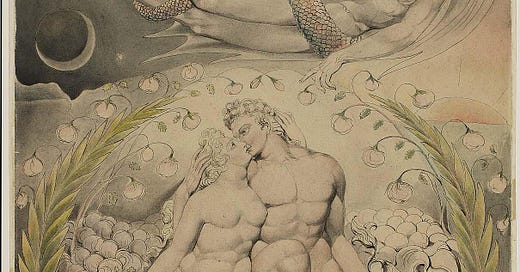




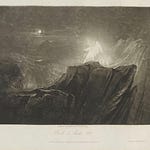
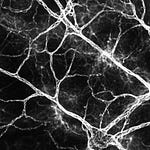

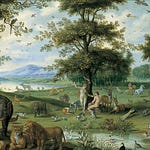
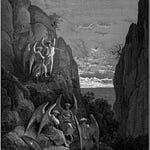
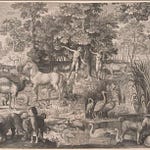
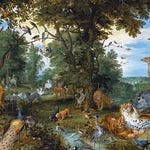
Share this post